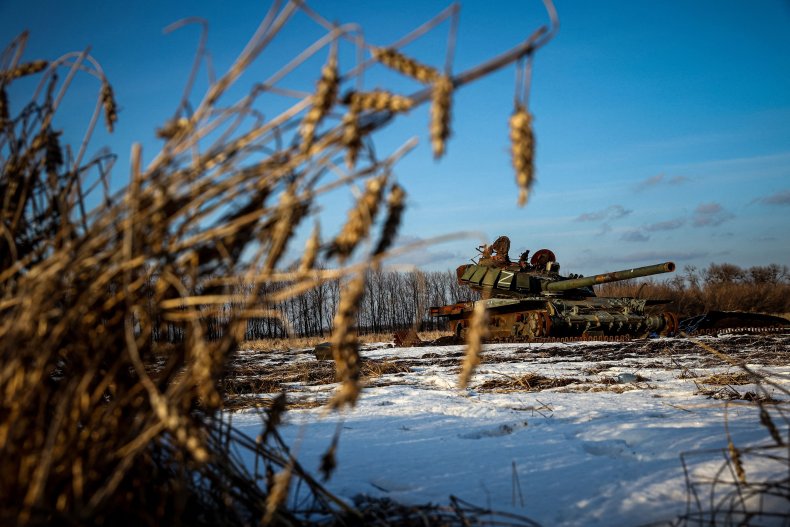
As Ukraine defends its sovereignty against the ongoing Russian invasion, its political leaders have found themselves at odds with some of their biggest supporters in recent weeks.
A growing number of Eastern European countries are moving to ban Ukrainian agricultural imports, citing concerns that importing the foreign goods could weaken their own economies. Three nations—Slovakia, Poland and Hungary—have initiated such a ban, and others could soon follow despite international backlash.
The bans come as Ukraine, whose fertile lands have given it the nickname of Europe’s breadbasket, has taken economic hits amid the Russian invasion, which began in February 2022 and disrupted businesses, prevented grain shipments and destroyed infrastructure across the country. Throughout 2022, Ukraine’s gross domestic product (GPD) fell 30 percent.
On Tuesday, Bulgaria and Romania signaled they could become the next countries to ban Ukraine’s agricultural imports, threatening to add even more pressure to Ukraine’s economy as it seeks to rebound from the economic downturn caused by Russia’s invasion.

Anatolii Stepanov/AFP/Getty
The dispute between Ukraine and other Eastern European nations signals a rare fracture among the European allies amid the Ukraine war. With the notable exception of Belarus, Europe has largely rallied behind Ukraine, providing vast economic support and weaponry that has bolstered its defense efforts against Russia.
Why Are Some Eastern European Countries Banning Ukrainian Imports?
Eastern European countries are moving to ban Ukrainian agricultural imports to protect the economic well-being of their own farmers, who have raised concerns that recent imports of cheaper Ukrainian goods have resulted in lower prices, creating new economic pressure.
The war prompted the closings of Ukrainian ports, including some of the most important such as Mariupol and Mykolaiv, along the Black Sea, forcing goods to be transported over land across Eastern Europe. This has resulted in more Ukrainian product in these Eastern European countries, which, local farmers say, has resulted in reduced prices for their own goods.
Newsweek has reached out via email to Ukraine’s Economic Ministry.
In March, prime ministers of Bulgaria, Hungary, Poland, Romania and Slovakia sent a letter to European Commission President Ursula von der Leyen, saying that tariffs on Ukrainian imports, which were temporarily suspended amid the invasion, may need to be reintroduced to allay domestic economic hardships.
Polish Prime Minister Mateusz Morawiecki tweeted, “Let’s support Ukraine, but let’s do it wisely and, above all, let’s put the interest of the country and Polish farmers in the first place!”
Wspierajmy Ukrainę, ale róbmy to mądrze i przede wszystkim stawiajmy interes krajowy i polskich rolników na pierwszym miejscu!
🇵🇱🇷🇴🇸🇰🇧🇬🇭🇺✉️🇪🇺
PEŁNA TREŚĆ LISTU 5 przywódców ⤵️https://t.co/uIeZmOXVrZ— Mateusz Morawiecki (@MorawieckiM) March 31, 2023
Bulgaria on Wednesday will decide whether to ban some agricultural products. Bulgarian Agriculture Minister Yavor Gechev said the decision will “send a strong signal for Europe” to “take action” to soothe the economic situation, according to Ukrainska Pravda.
“Bulgarian farmers say they don’t want subsidies, they want their markets. Unfair competition is being created on the part of Ukraine,” Gechev said.
Ukraine, European Union Condemn Agricultural Import Bans
These efforts have been met with criticism from Ukraine. In a statement, Ukraine’s Agricultural Ministry condemned the decision from Poland, one of Ukraine’s most ardent international supporters. The ministry wrote that while Ukrainian agricultural producers “understand the needs of their Polish colleagues,” Poland’s “unilateral” decision to man Ukrainian products “will not speed up the positive resolution of the situation.”
“We understand that Polish farmers have a difficult situation, but we emphasize that now the most difficult situation is for Ukrainian farmers,” the ministry wrote. “It is on the territory of Ukraine that the war is going on, it is Ukrainian farmers who suffer colossal losses from Russia’s war against Ukraine, and it is Ukrainian farmers who die in their fields from Russian mines.”
The European Union has also spoken out against these bans.
“In this context, it is important to underline that trade policy is of EU exclusive competence and, therefore, unilateral actions are not acceptable,” a European Commission spokesperson told Reuters. “In such challenging times, it is crucial to coordinate and align all decisions within the EU.”
 Print
Print




